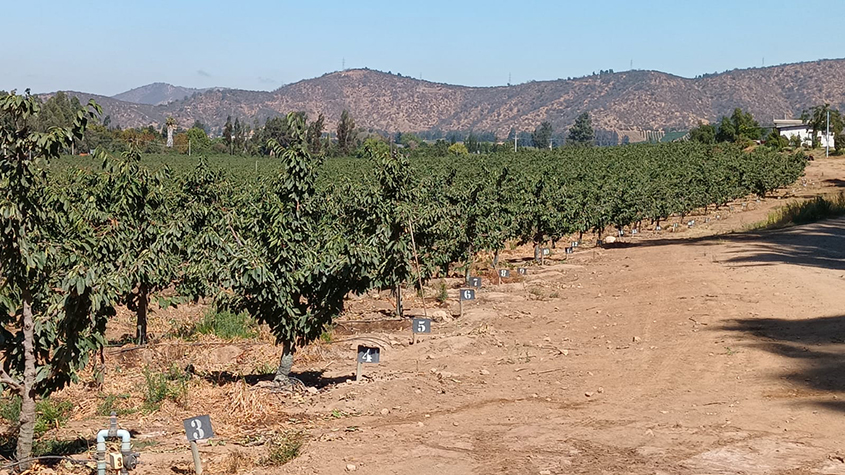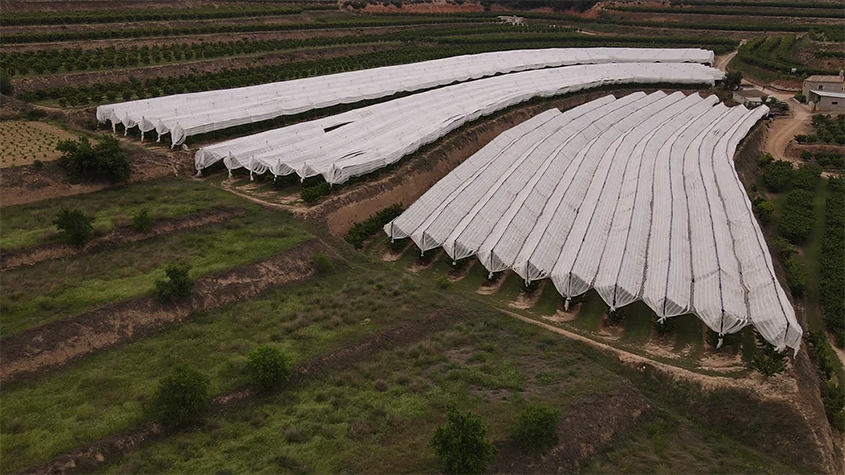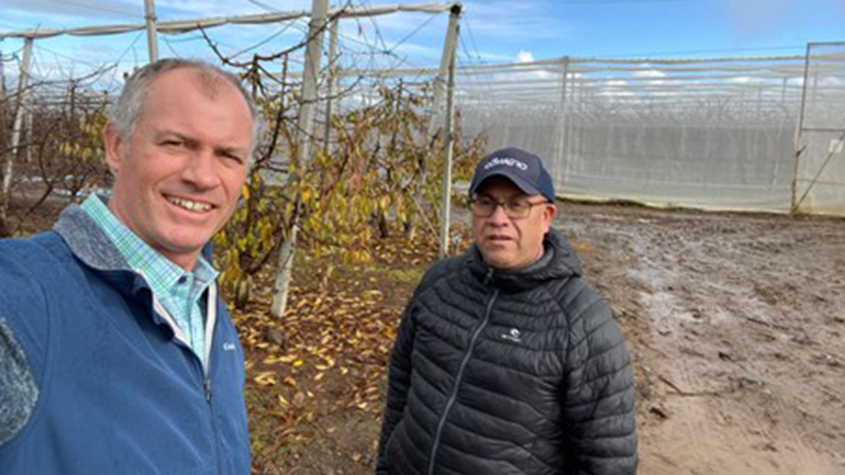How Chile’s Cherry Farms Are Readying Themselves For Climate Change Using Green Technologies
October 18, 2023
In the pastoral landscapes of Chile, two farming ventures face increasing challenges from unpredictable weather, water scarcity, and rising temperatures. This is putting a strain on their businesses and threatening their livelihoods. WIPO GREEN is helping these farmers adapt to climate change by connecting their needs with corresponding green technology providers. Through this process, farmers hope to reduce their reliance on non-renewable energy, improve their yields, and become more resilient to the effects of climate change. But this challenge isn’t limited to Chile. As climate change intensifies, farmers around the world will need to adapt their practices.
Farms are on the frontlines of a climate crisis
Cristian Hernández Carrillo manages cherry orchards in Osorno, Chile. His region faces considerable climatic adversity: unpredictable hail, extreme winds, and excessive rains. Further north in Chile’s Malloa commune, Agrícola Tambo, a fruit exporting firm, is dealing with its own climate-induced challenges. For Cristóbal Valentín Morales, the farm’s administrator, every year brings with it less rain. What’s happening in Osorno and Malloa reverberates beyond the local communities. Many farms and vineyards in Chile, for instance, have moved south in search of more rain as a response to changing climatic conditions. But the farmers are now finding out that even the southern parts of Chile are not immune to the effects of climate change.

The problem goes beyond meteorological aberrations. Adapting to climate change in an industry that runs on slim margins and is one bad season away from financial peril is difficult. Morales knows that the water pumps on his farm, which run from October to March to nurture the cherry trees, account for a major part of their yearly electricity bill. But the quality of cherries cannot be compromised.
The orchards in Osorno face financial difficulties of their own as increasingly strong winds tear through protective covering systems designed to shield the prized cherries. “The production of late cherries in the southern part of Chile (Osorno) began as an attractive commercial alternative with good returns to producers. However, given the climatic conditions of rain, winds and solar radiation the quality and condition of fruit has been affected, resulting in lower returns for producers. As a consequence, profitability is diminished”, said Ramiro Poblete, an external advisor to Cooprinsem, an agricultural cooperative that connected WIPO GREEN consultants to the cherry orchards.
WIPO GREEN finds solutions
As part of WIPO GREEN’s Latin America Acceleration Project, funded by Funds-In-Trust Japan IP Global and implemented in collaboration with Chile’s National Institute of Industrial Property (INAPI), the on-ground consultant team from IALE Tecnología, a private consulting firm, connected Agrícola Tambo with Tesla Energy. Agrícola Tambo wants to implement technology that saves energy costs and lowers its carbon footprint while maintaining the quality of the cherries. Tesla Energy brings to the table its know-how in solar energy solutions, and IALE Tecnología serves as technology agents, liaising and fine-tuning communications and expectations among all parties involved. The solution proposed is effective and simple: replacing electric irrigation pumps with solar-powered ones.
In Osorno, WIPO GREEN facilitated a partnership with VOEN, a German company specializing in premium wind-resistant agricultural covering systems. The primary need of the cherry farm is defense against climate-induced issues such as fruit splitting, flower loss, and plant diseases, which result in inferior product quality and production loss. Leveraging its local commercial operations in Chile, VOEN tailored the canopy technology to safeguard the quality of the fruits from these climate-related setbacks, which can enable growth of its export-focused fruit farming. Once installed, these covering systems will shield the fruits from the harsh winds and hail that frequently affect the region.
“VOEN covering systems will easily adapt to the structure that Cristian is currently using in his cherry orchards. The self-venting covering system will allow the cherry crop to produce its maximum potential in terms of yield and quality”, says Roberto Johow, a representative of VOEN, who has visited the cherry farm in Osorno.

A financial knot
The solutions are promising, but while the technologies seem to be within arm’s reach, implementation stumbles over financial hurdles. Initial investments in green technologies can be prohibitively high, especially for smaller operations. It also adds a new layer of complexity to an already intricate problem: how to ensure that financial systems evolve in tandem with environmental needs.
Chile’s global standing as a fruit-exporting powerhouse magnifies the relevance and importance of its domestic problem-solving. The efforts undertaken in Osorno and Malloa to adapt to the changing climate have implications far beyond Chile’s borders. While these Chilean enterprises await the investments that could make them global models for sustainable farming, their predicament epitomizes a world at an economic and environmental inflection point. Their struggle is not just about averting local calamities, but about rewriting the rule book for what constitutes wise, long-term investment.
IALE Tecnología, in collaboration with INAPI and WIPO GREEN, is working to establish funding mechanisms for both technologies. An application for funding has been filed with a national agricultural fund in Chile for the technology earmarked to be deployed in Malloa. For Tesla Energy, following an assessment of multiple options, the current strategy is to pursue a direct leasing model. These collaborative efforts and strategic funding approaches will be instrumental in driving sustainable agricultural and energy solutions for the region.

If Agrícola Tambo can go solar and Osorno can shield its cherries, then perhaps farms in Viet Nam can mitigate water scarcity, and cocoa farmers in Ghana can adapt to rising temperatures. WIPO GREEN serves as a catalyst and its matchmaking functions create a blueprint for a replicable model. As a platform, WIPO GREEN is preparing itself for the future. The database is continually updated, accessible worldwide, and serves as an expanding resource for green innovation. As climate change intensifies, the connections facilitated by WIPO could accelerate the sharing of technologies and adaptation strategies, enabling farms around the globe to become more resilient. After all, climate change doesn’t recognize borders, and neither should the fight against it.
The struggle of these orchards is, in many ways, the struggle of the world at large: to balance immediate economic needs against the long-term viability of life on a warming planet. It is a delicate balance, but as these Chilean farms show, it’s not an impossible one. Their journey underscores the essence of investing in climate adaptation technologies – not just for profit, but for survival. In the precarious ledger of climate change, this is an entry worth making.


